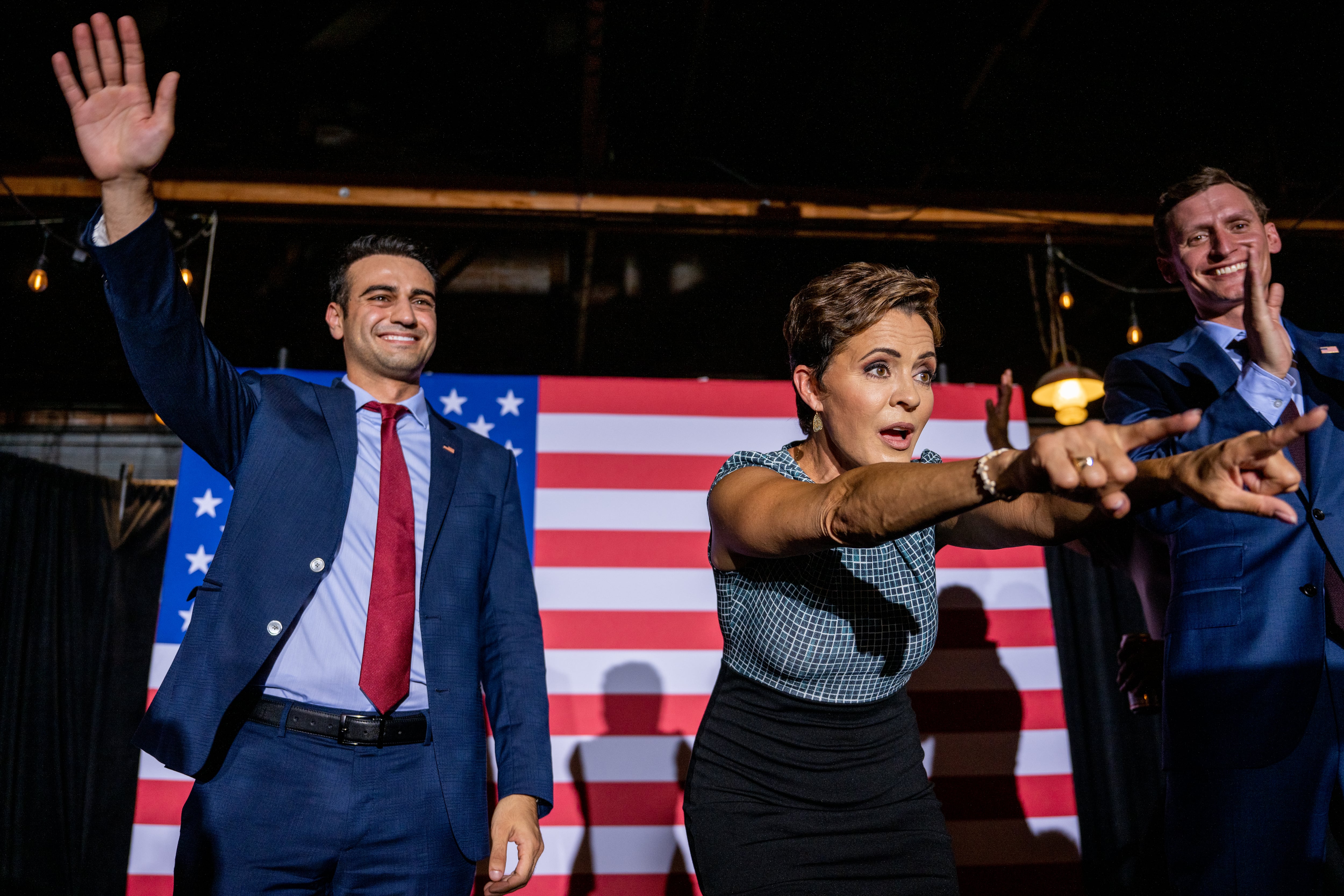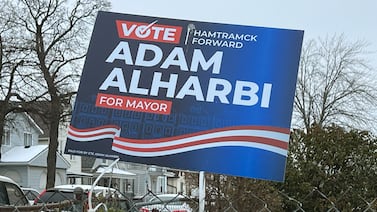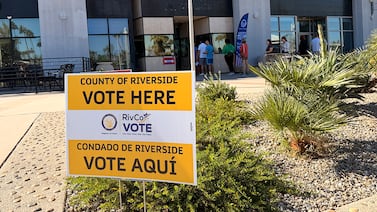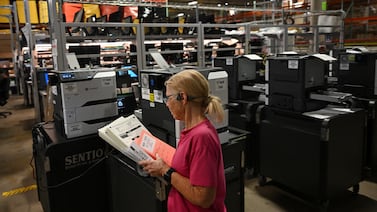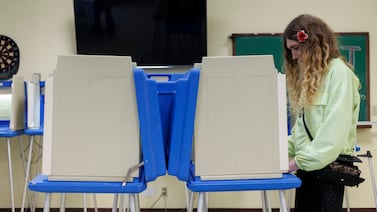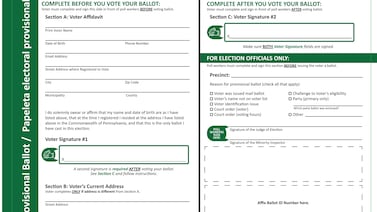Votebeat is a nonprofit news organization reporting on voting access and election administration across the U.S. Sign up for our free newsletters here.
GOP candidates for Arizona’s top offices who claim the November election was stolen from them have spent months presenting shape-shifting arguments in court — and six months after races were called, they aren’t done.
A Maricopa County judge on Monday granted losing GOP gubernatorial candidate Kari Lake a trial on a claim initially made in December that has changed over time as it made its way up to the Arizona Supreme Court and back down again. That trial begins Wednesday.
Meanwhile, a Mohave County judge is considering granting losing GOP attorney general candidate Abe Hamadeh a new trial based on a claim he presented in court Tuesday: that the statewide recount in December and other records obtained since then offered new evidence that he really won.
It’s unusual for these types of cases to be ongoing in May. Court challenges to election results have an expedited time frame set out in state law for a reason: So claims of problems can be resolved before the winners take their seats. Gov. Katie Hobbs and Attorney General Kris Mayes, both Democrats, took office in January.
There’s a high bar in Arizona to prove in court that election results should be overturned, and there is little precedent for it — especially months later. Allowing the midterm challenges to linger for months has already caused uncertainty for voters regarding the stability of their elected offices, according to voter advocates and attorneys for the state and county.
“Every day this case exists without a final judgment is another day the contestee and his friends and his colleagues and his constituents can continue to impugn the validity of our election processes in Arizona … and cast doubt on the very foundation of our nation — free, full and fair elections,” Craig Morgan, the lawyer representing Secretary of State Adrian Fontes, said on Tuesday during the Hamadeh hearing.
The long timeframe and seemingly neverending hunt for evidence has also given the losing candidates ongoing hooks to spread false claims about their contests, potentially deepening distrust in the system, said Alex Gulotta, Arizona director of the voting rights organization All Voting is Local.
“The longer that misinformation about the election is unaddressed, or appears to have validity because there are still court processes going on, the more harm,” he said.
Attorneys for Lake and Hamadeh told judges in the past week that they want to inspect ballots or ballot envelopes in hopes of finding evidence to prove their claims, but attorneys for the state and Maricopa County say the time to fish for such evidence is long past.
Proving their claims won’t be easy. Lake will need to offer clear and convincing evidence, the judge wrote, on a far-fetched claim that Maricopa County completely failed to verify voter signatures on mail-in ballots and this caused her to lose to Hobbs by more than 17,000 votes.
Hamadeh, who lost to Mayes by only 280 votes, would need to prove his claims that tabulation machines failed to properly count hundreds of votes in his favor, and that counties incorrectly rejected ballots from voters who were registered to vote.
Taxpayers pay while Lake raises money
The many court milestones spread over months have given candidates consistent fundraising opportunities. Lake, more than Hamadeh, has taken advantage of these milestones to ask for money, according to a review of their public statements and solicitations.
“Kari Lake quite literally has nothing else to do, and the fundraising aspect of it is the goal,” said Barrett Marson, a Republican political strategist in Arizona. “It’s not the bug, it’s the feature.”
This week was no different. In a live Twitter audio broadcast on Tuesday morning, the day after the judge granted her request for a trial, Lake said supporters could help pay her legal fees by visiting her website or the website of a nonprofit advocacy group set up for this purpose.
“People all across the nation have said, ‘Here is 25 bucks, please don’t stop fighting to secure our elections, and so that’s how we are paying for it,’” she said.
The full amount Lake and Hamadeh have raised this year as litigation has dragged on is not publicly available because candidates do not have to file campaign finance statements at all in the year after their election. Lake raised more than $2.5 million from the day after the election through the end of December, according to an analysis by The Arizona Mirror. The Mirror found that, while she spent $3 million in that timeframe, less than 10% of that spending was related to her lawsuit. The amount Lake raised for the nonprofit, Save Arizona Fund, is not required to be disclosed under campaign finance laws.
Meanwhile, Arizona taxpayers continue to pay state and county attorneys to defend the election.
Maricopa County as of March had used seven in-house attorneys for the 2022 contests, and had also paid outside counsel more than $100,000. Since taking office in January, Secretary of State Adrian Fontes has paid outside counsel more than $32,000 for continued defense related to the cases. Hobbs, who was secretary of state until January, used a pro-bono team for the 2022 challenges.
Maricopa County Recorder Stephen Richer, who oversees early-ballot signature verification for the county, said the latest legal dispute in the Lake case is seen by the vast majority of Arizonans as “the pathetic last gasps of a sore loser.”
Recorder: “Election law amateurs”
Lake has been calling her election “fraudulent” from the time it became clear Hobbs would win, saying that Maricopa County officials intentionally rigged the election against her and often calling them “crooks.” So far, courts have said she doesn’t have evidence to back up any of those claims.
Maricopa County Superior Court Judge Peter Thompson allowed two out of her initial 10 claims to proceed to trial, but then dismissed them, citing lack of evidence. That all happened quickly, as state law requires, and was done before the end of December.
There’s a few ways Lake’s attorneys could have sped up the appeals process at this point, either by filing a special action challenge or by appealing directly to the Supreme Court instead of the Court of Appeals, which county attorneys said in a filing would have allowed the case to be resolved before Hobbs took office.
Lake’s attorneys did not do this.
Richer said this is because her attorneys are inexperienced in Arizona election law. Kurt Olsen previously was an attorney in New York, and Bryan Blehm worked for a family law firm in Phoenix.
“Because she is represented by election law amateurs who have been racking up sanctions in various courts — admittedly, likely the only people who would take her case — we’re still dealing with this six months after Katie Hobbs won,” Richer, a Republican, told Votebeat in a statement.
Kari Lake and her attorneys did not respond to a request for comment.
She spent the weeks following her trial court loss on a tour across the U.S., broadcasting her claims of a stolen election, according to The Arizona Republic, and asking for money on Twitter. When the appeals court affirmed the trial court’s decision on Feb. 16, she posted a link to Save Arizona Fund’s website and said she was taking the case to the state Supreme Court. “Buckle up, America!” she wrote.
The state Supreme Court on March 22 affirmed the lower courts’ decisions on all claims but one, the claim about fraudulent voter signatures. It also subsequently sanctioned Lake’s lawyers over another claim. “Help fuel our fight by making a donation at karilake.com,” Lake tweeted the next day.
Lake’s claim about fraudulent voter signatures has evolved over time. County and state attorneys have said consistently that she failed to state a claim altogether, and have refuted any notion that workers didn’t follow law and approved fraudulent voter signatures.
When casting votes by mail in Arizona, voters have to sign the envelope they put their ballot in, and county officials use that to confirm it came from the right person by comparing the signature to those they have on file.
Lake initially wrote that the county recorder decided that some voter signatures didn’t match but “nevertheless accepted a material number of these early ballots.”
After the state Supreme Court directed him to reconsider his dismissal of the claim, Judge Thompson heard arguments on Friday. He then decided Tuesday that the actual claim Lake’s attorneys appeared to be making was that, during two steps in their process, county workers failed to verify the signatures at all.
That’s an argument that Lake’s attorneys themselves have already contradicted by presenting witness statements from temporary workers who reviewed signatures and by acknowledging that the county rejected hundreds of signatures the workers deemed “bad.” In fact, the county rejected double the amount of “bad” signatures as it did in prior elections, according to a Votebeat review of changes Richer has made to the process since 2020.
The trial is scheduled to run from Wednesday to Friday. Even if Thompson dismisses this final claim, Lake says it won’t end there. She said during Cardone’s broadcast on Tuesday morning that “we are going to take this to the U.S. Supreme Court.”
Hamadeh claims hundreds of uncounted votes, ballots
In Hamadeh’s case, Judge Lee Jantzen initially allowed four of the candidate’s five claims to go to trial in December, but then dismissed them all from the bench after only a few hours of arguments..
During that Dec. 23 trial, Hobbs’ attorneys didn’t reveal that her office was aware that the statewide recount in process had already revealed numerous ballot counting errors in Pinal County, later saying that she believed she was bound by the court not to say anything until the recount was complete.
The recount results were announced less than a week later, after court proceedings had ended. They showed that Pinal County had failed to initially tabulate hundreds of votes in the race, which helped close the gap between the candidates from 511 to 280 votes.
On Jan. 4, Hamadeh filed his motion for a new trial, saying that the recount revealed new evidence that he won the election. Since then, he told the court, he received responses to public records requests that, he believes, show provisional ballots were incorrectly rejected.
Hamadeh’s lawyers want access to ballots they believe will show uncounted votes in his favor that the tabulation machines failed to count, as well as entire ballots the county rejected after determining the voter wasn’t registered to vote. The attorneys emphasized in court Tuesday that they believe Hobbs’ attorneys wrongly withheld information from the court during the initial trial, citing a Votebeat story mentioning that her office knew of Pinal County problems by Dec. 7.
While Hamadeh’s attorneys claimed that declining to provide a new trial would erode voter confidence, the state and county argued the opposite. Judge Jantzen said he was hoping to decide whether to allow for a new trial within the next few weeks.
Gulotta, the voting rights activist, said he would love to figure out a way to expedite appeals, or somehow cut off fundraising at a certain point. He foresees election contests being drawn out again in future elections, so long as it’s profitable for the candidates.
The extended timeframe may be good for the candidates, Marson, the GOP strategist, said, but it’s not good for the Republican party in the state.
“Republicans have to move on to 2024, and, eventually, 2026,” he said. “Republicans have a big election for Senate in 18 months, and we really do have to focus on that … It is truly time for Republicans to turn the page.”
Jen Fifield is a reporter for Votebeat based in Arizona. Contact Jen at jfifield@votebeat.org.

